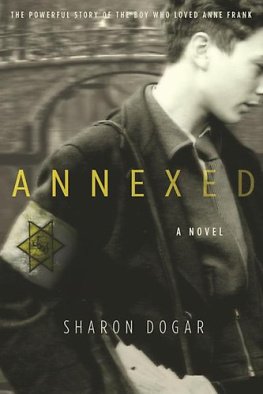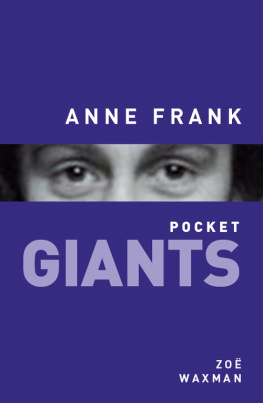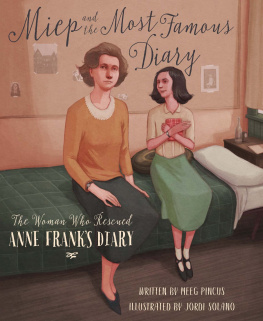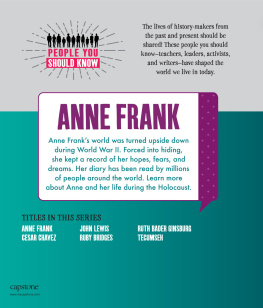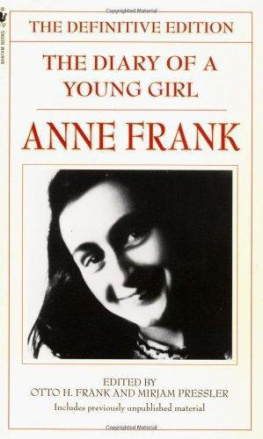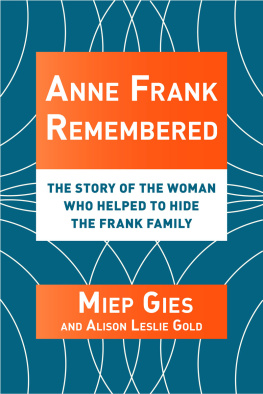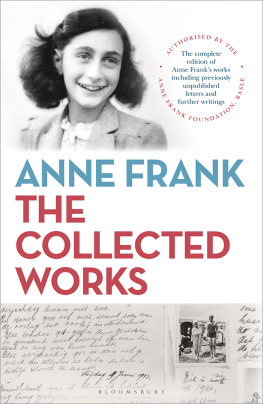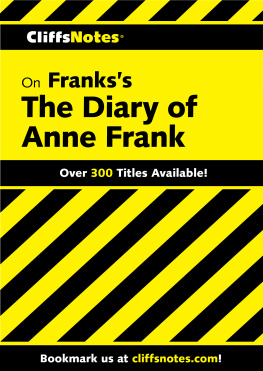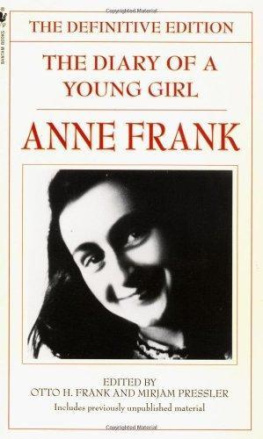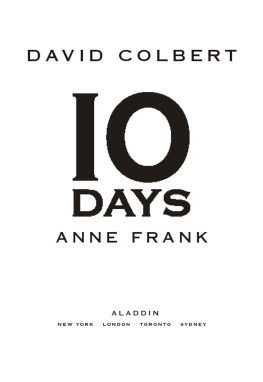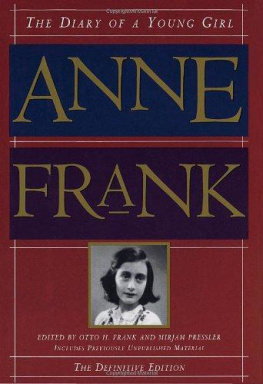Annexed
Sharon Dogar
H OUGHTON M IFFLIN
HOUGHTON MIFFLIN HARCOURT
BOSTON NEW YORK 2010
TO JEM, XA, AND ELLA,OUR CHILDREN.THIS IS FOR YOU.THANK YOU. May you never lay your head
down without a hand to hold...
Copyright 2010 by Sharon Dogar
First published in 2010 by Andersen Press Limited
20 Vauxhall Bridge Road, London SW1V 2SA
www.andersenpress.co.uk
All rights reserved. For information about permission to
reproduce selections from this book, write to Permissions,
Houghton Mifflin Harcourt Publishing Company,
215 Park Avenue South, New York, New York 10003.
Houghton Mifflin is an imprint of Houghton Mifflin
Harcourt Publishing Company.
Library of Congress cataloging-in-publication data is on file.
ISBN 978-0-547-50195-6
The right of Sharon Dogar to be identified as the author of this work
has been asserted by her in accordance with the Copyright, Designs,
and Patents Act, 1988.
Manufactured in the United States of America
DOC 10 9 8 7 6 5 4 3 2 1
4500249744
Preface
It is nearly five months into 1945. The Second World War is about to end. Peter van Pels is in a Nazi concentration camp called Mauthausen. He is recorded as having been admitted to the sick bay there on April 11. This would mean he was in the sick bay for more than three weeks, which is either inaccurate or extraordinary. No one who had survived the Nazi occupation of Holland, a transport to Auschwitz, the walk through Poland and Austria to Mauthausen, and then "worked" for three months, could be expected to survive for more than a few days at most in a sick baywhich was really just a river of dying people passing through. There was no treatment, and barely any foodnot at this stage of the war.
But extraordinary stories of survival against all odds happened again and again throughout the Holocaust, so what if it was true? What if, while he is lying in the sick bay, Peter begins, in memory, to travel through his short life? He is eighteen. He has spent two of those eighteen years in the "Annex" in Amsterdam: a place made famous by Anne Frank's diary. But what was it like for Peter?
In this novel, based on history, I try to imagine what it might have been like to have actually lived with Anne Frank. To become the target of her love, and to be so cruelly torn apart from her, just as liberation was coming to Holland.
Part of what is so heartbreaking about the story of Anne Frank and her family and friends in the attic is that they so very, very nearly survived and made it through to the end of the war. They were on the last train into Auschwitz from Holland. In the end, only one of them made it, Otto Frank, Anne's beloved father.
As I write this, Anne Frank (if still alive) would have only been in her eighties. She might still be writing stories, still be reminding us of what it means to stay alive to the beauty of the world when all around you lies evidence of death, hatred, and destruction.
But for all her unique intelligence and aliveness, Anne did not live her life with the knowledge that one day she would become an icon. She was a fiercely passionate, intelligent, contemptuous, and, at times, difficult young woman. Otto Frank said, publicly, that he "did not know" the Anne Frank that everyone feels they know so well from her diary, and that from this he must deduce one simple thing: "that as parents we do not know our children." Any "imaginary" account of what happened in the Annex should take note of this statement from Anne's father. The Anne seen in her diary is not necessarily the same Anne that the people in the attic felt they knew.
And what of Peter? Does the Peter that Anne writes about bear any resemblance to who Peter really was? What's it like to be in someone else's diary (especially one so famous), pinned down for all time as seen through the eyes of someone else? What if Peter, as Anne suggests several times, wasn't at all as she thought?
The way we see both people and history can change over time. Anne's diary is a vitally important part of our history. It tells us in some detail what it was like to live in hiding during the Nazi occupation and "cleansing" of Holland. The facts of the Holocaust are not something writers should play with, but what we can do is reimagine the story of what happened between the people in the Annexand how they felt about each other. How do we know what Anne would say about it all now, if she could? She would almost certainly feel more charitable toward her mother and Fritz Pfeffer. What we feel as adolescents can be both powerful and passionate, but it is not the only truth.
And what would the others have to say about her portrayal of themespecially Peter? This is what I've imagined. How it might all have felt from Peter's point of view. I have done my best not to change the facts of their existence in the Annex, or (in as far as it is possible to know) what happened after they left the Annex and entered the world of the Nazi death camps.
Reimagining can be an important part of keeping history alive, and there was no one more acutely alive, clever, and curious about the world than Anne Frank. Sadly, we can't change what happened to her and her family and friends. But we can keep on telling her story, keep on thinking about what it means to be human, in both our love and our hatred for ourselvesand we can (as Anne Frank has) try to keep the facts of what happened during the Second World War alive for each new generation, in the hope that they remain aware of how catastrophic the consequences of hate can be.
Prologue: MAY 1945PETER: AUSTRIA, MAUTHAUSEN, SICK BAY
I think I'm still alive.
But I'm not sure.
I'm ill.
I must be because I'm lying down. We never lie down.
In the camps there's no such thing as rest.
I should be carrying rocks up the quarry steps. Its a long way to the top of the quarry. I never know if I will make it. If someone ahead of us falls, we all fallunless we're quick. Sometimes the guards wait until one of us is on the very last step, already thinking of laying down his burden, of the relief of letting down the weight. That's when they reach out with their boots and kick us down. We fall like dominoes.
That's all I remember, falling down the side of the quarry. I feel my body jolt and bounce. I feel the other bodies land on me. I am crushed, bony body on bony body. We are all so sharp now. My bones crunch. I am suffocating. The bodies move off me, the dead pushed aside by the living. I can breathe. My bones click back into place. I am alive and must get up, or I will be piled up with the dead. I try to stand.
I can see why the guards laugh. I look like a puppet. A puppet of bones with his strings all cut. I stand. I walk. I go on. But I know that really I am still dead on the ground, that each day a piece of us dies.
And we let it die. We have toto survive.
Soon someone will come and wake me and the nightmare will begin.
I'm waiting for the word, that word:
W YSTAWACH.
Wake up.
If they come, then I must stand up and work, or I must die.
Perhaps I am already dying.
Everyone does in the end, there's no other way out.
And now it's my turn.
Its a relief.
The problem with lying down is that it brings memories. They keep on coming, reminding me of who I am.
The world.
My life.
The German Jews have a word for it.
Heimweh.
The longing for home. We avoid it if we can. It can be fatal.
I am hot. My head aches. My body hurts. These are just words, they don't explain the pain. The way my bones grind against each other. There are no words for pain like this.
But the memories are worsepictures of a time before. Of a time I must deny, so that when they come to wake me I can go on. Put one foot in front of the other, pretending that there is only this moment, this day, this night to get throughand survive.
Next page
